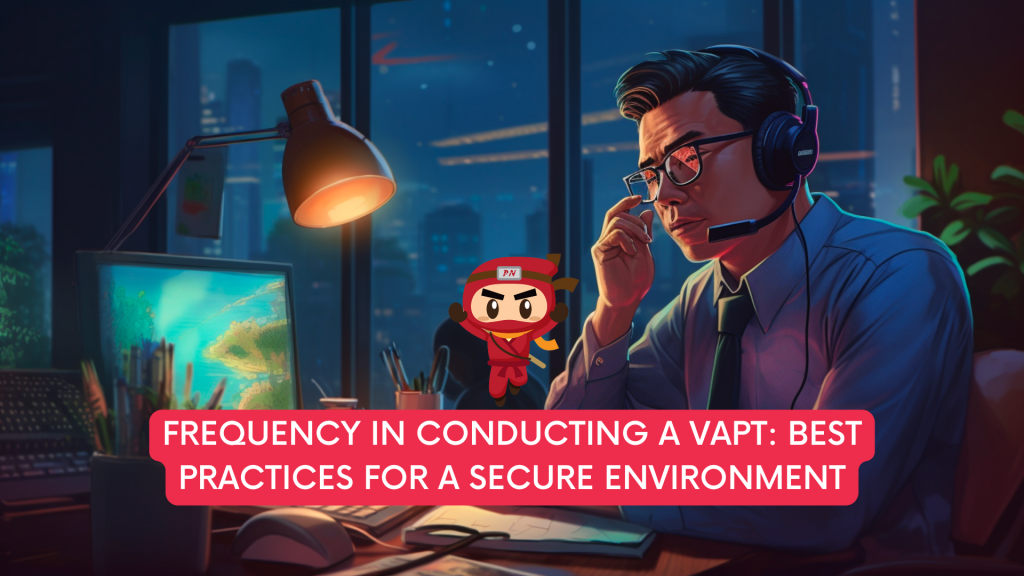
Businesses face a continuous threat from cyber attackers in the rapidly evolving digital landscape. Regularly conducting Vulnerability Assessment and Penetration Testing (VAPT) is a crucial practice to maintain the robustness of an organization’s security infrastructure. But how frequently should a company carry out VAPT? This article discusses the importance of VAPT and provides recommendations on the frequency of conducting these tests for a secure business environment.
Vulnerability Assessment and Penetration Testing, collectively known as VAPT, are two types of security testing methodologies designed to identify and evaluate vulnerabilities in a system. Vulnerability Assessment is the process of identifying and quantifying vulnerabilities in a system, while Penetration Testing involves simulating attacks from a malicious source to exploit these vulnerabilities.
In an era marked by increasing digital threats, regular VAPT is not a luxury; it is a necessity. The frequency of VAPT has a direct impact on a company’s ability to maintain a secure environment. By conducting VAPT at regular intervals, organizations can:
The frequency of VAPT depends on various factors. Here are some general recommendations:
After Every Major System or Network Change
Any significant changes to a system or network infrastructure, such as the introduction of new software, hardware, or significant updates, should be followed by a comprehensive VAPT. This ensures that any new potential security weaknesses introduced with the changes are identified and rectified promptly.
Annually as a General Rule
As a general rule of thumb, a full-scale VAPT should be conducted at least once a year. This helps keep track of any new vulnerabilities that may have emerged and ensures that the organization’s systems and networks remain secure in the face of the latest threats.
Quarterly for High-Risk Systems
For high-risk systems that contain sensitive information or are crucial to the business operations, a more frequent schedule, such as quarterly VAPT, is recommended. This ensures that the highest risk areas of the business are adequately safeguarded.
In Compliance with Regulatory Requirements
Certain regulations and standards, like the Payment Card Industry Data Security Standard (PCI DSS) or the General Data Protection Regulation (GDPR), require organizations to conduct VAPT at specific intervals. Therefore, the frequency of VAPT should also take these regulatory requirements into account.
VAPT is an integral part of a robust security posture for any organization. The frequency of conducting VAPT should be decided based on the organization’s specific circumstances, including its risk appetite, the sensitivity of data it handles, and any relevant regulatory requirements. By regularly conducting VAPT, organizations can stay one step ahead of cyber threats and protect their valuable data and reputation.
One of the best ways to combat cybersecurity threats in today’s modern time is by conducting regular penetration testing. Remember, if you suffered a data breach under the PDPA, you could be liable for up to a financial penalty of S$1,000,000. Thankfully, Privacy Ninja is here to help you check if there are any vulnerabilities in your system.
Privacy Ninja can assist you in this endeavor by providing penetration testing services, which check if your organisation has vulnerabilities that could be exploited by bad actors, whether in your email environment or your organisation in general.
Privacy Ninja has years of experience in cybersecurity and offers quality services, as evidenced by the feedback from its clients as the years go by. It is a licensed VAPT provider (Penetration Testing Service License No. CS/PTS/C-2022-0128) and has the best team of professionals who are experts in their field, leaving no stone unturned in checking for any vulnerabilities in your system or organisation as a whole.
Moreover, we work hand in hand with our clients and deliver results on time, especially when there is a hint of vulnerabilities that need to be checked. Most importantly, Privacy Ninja has a Price Beat Guarantee, which makes the service even more affordable but will not leave the quality of services each client deserves.
What are you waiting for? Choose Privacy Ninja now as your penetration testing partner and experience the quality of services brought to you by cybersecurity experts at an affordable price, Price Beat Guarantee!
Role of Enhanced Access Controls in Safeguarding Personal Data in Telecommunications that every Organisation in…
Effective Incident Response Procedures in Strengthening Data Security that every Organisation in Singapore should know…
Crucial Role of Regular Vulnerability Scanning that every Organisation in Singapore should know. Strengthening Your…
Enhancing Data Security with Multi-Factor Authentication that every Organisation in Singapore should know. Enhancing Data…
Strong Password Policy as a first line of defense against data breaches for Organisations in…
Importance of Efficient Access Controls that every Organisation in Singapore should take note of. Enhancing…
This website uses cookies.